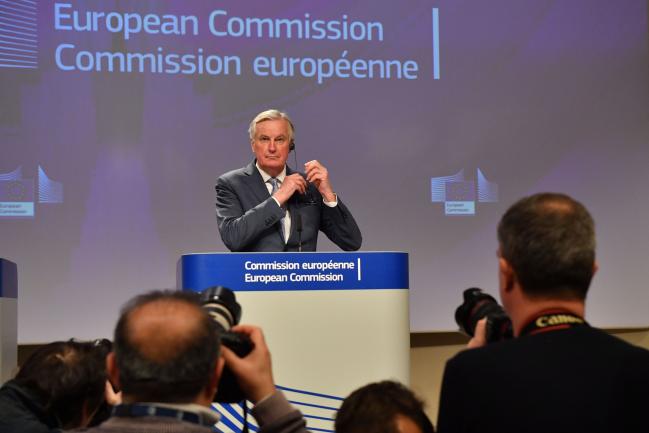
(Bloomberg) — The European Union’s chief Brexit negotiator insisted that a “highly ambitious” trade deal is on offer for the U.K. only if Prime Minister Boris Johnson signs up to strict rules to prevent unfair competition. The pound fell.
The EU kicked off 11 months of tough talks over a new partnership with the U.K., with Michel Barnier first out of the gate in setting out the bloc’s negotiating lines in Brussels. Johnson is delivering his own major speech in London. It’s the first working day since Britain left the EU after 47 years of membership, which Barnier said had been a sombre moment.
“We now have to address the consequences of the choices the U.K. has made.” said Barnier. “Because of those choices the U.K. will no longer be able to benefit from the rights and advantages of the EU.”
After three years of bad-tempered talks and last-minute breakthroughs over the U.K.’s political withdrawal, early signs indicate that the parties could struggle to avoid a cliff-edge when it comes to agreeing their future trading arrangement.
The EU’s leadership believes the rest of the year isn’t long enough to strike the type of comprehensive deal Johnson says he wants, but it has signaled willingness to enter talks on a slimmed-down version. Barnier said the “exceptional offer” is conditional on commitments to ensure a level playing in areas such as taxation, labor rules and environmental standards.
“We need to make sure competition is and remains open and fair,” he said.
Barnier said the EU isn’t looking for “alignment” of rules, but “consistency” from the U.K. He added that he wants “mechanisms to uphold the high standards we have.”
The EU’s draft negotiating mandate, published as Barnier was speaking, said the U.K. needs to make “robust commitments” to ensure it doesn’t undercut the EU. On climate change, the U.K. is expected to maintain a system of carbon pricing and consider linking its domestic emissions market with that of the bloc.
U.K. View
Johnson’s government thinks that the time frame is sufficient to get a full deal, one at least as good as the deal that Canada reached with the EU. In his own speech, the prime minister will threaten to walk away from the negotiations rather than accept demands he sign up to the bloc’s single market regulations and the rulings of its court.
The EU trade deal with Canada removes tariffs on 98% of goods trade, raises tariff-free quotas, opens up public procurement so Canadian and EU companies can bid for each other’s governments’ contracts, and protects intellectual property. The EU and Canada negotiated for seven years before signing their trade deal in October 2016.
Johnson will tell EU ambassadors that he wants a comprehensive trade agreement but “Britain will prosper” even without such a deal. Sterling fell the most in a month, leading losses among Group-of-10 currencies, as traders brace for a chaotic break-up at the end of the month. The pound was 1.1% lower at $1.3066 at 10:50 a.m. in London.
One unknown factor is how much Johnson really wants an agreement with the EU. Many Brexit purists in his Conservative party would be happy without one.
Johnson’s team has been firm in rejecting what it sees as unfair demands from the EU side. The key clash is over whether Britain must sign up to the bloc’s single market regulations in exchange for access to tariff-free trade.
Equals
British officials want the EU to treat the U.K. as an equal in the negotiations. Johnson will point out that the EU repeatedly offered Britain a choice between Norway-style membership of the bloc’s single market, which would require keeping Brussels’ regulations, or a Canada-style free-trade agreement — and that he is choosing the latter.
But if no free-trade deal is possible by the end of the year, the U.K. will be ready to take a looser arrangement like Australia’s, Johnson will say. That would involve doing business on World Trade Organization terms in most areas, with tariffs on goods, while processes would be agreed to reduce some regulatory barriers.
(Updates with details of negotiating mandate from seventh paragraph)
Source: Economy - investing.com


